大学英语修辞学第十三章
英语修辞学课件
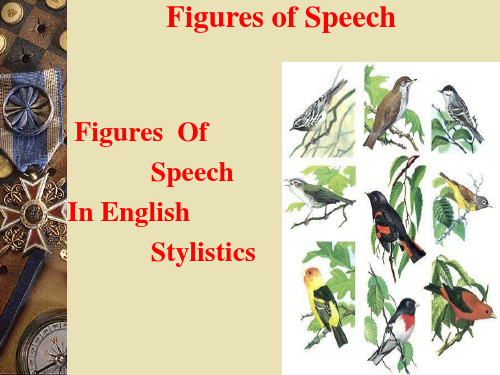
w w w w w w w w w w w w w
As firm as a rock As mute as a fish As strong as a horse As brave as a lion As obstinate as a cow As white as snow As black as ink / pitch As changeable as the weather As wet as a drowned rat As blind as a bat As fat as a pig As proud as a peacock As fresh as a rose
Type One: like
w Living without an aim is like sailing without a compass. w Marriage is like a beleaguered fortress: those who are without want to get in, and those within want to get out.
Metaphor
A figure of speech containing an implied comparison, in which a word or phrase ordinarily and primarily used of one thing is applied to another. (Webster‘s New World Dictionary)
All the world‘s a stage, And all men and women merely players; They have their exits and entrances, And one man in his time plays many parts, His acts being seven ages… (Shakespeare, As you Like it ) The first clause sets up the basic comparison. The tenor and vehicle invoked by the first line are elaborated in the lines that follow. The metaphor makes possible for the literary writer to explain things vividly in great detail.
现代大学英语第五册修辞总结
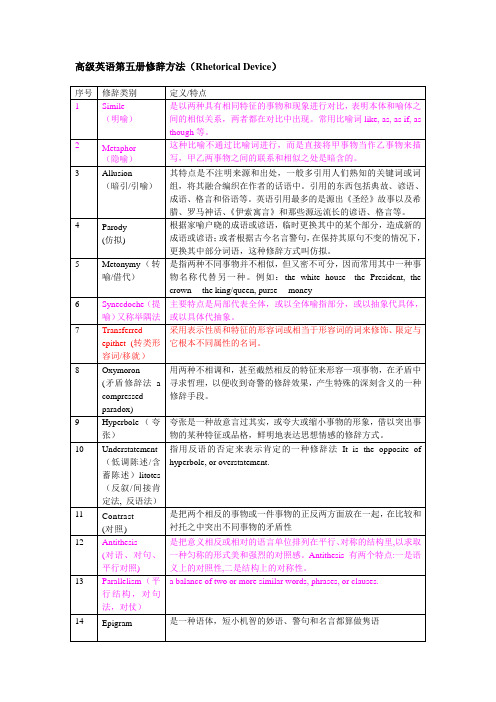
高级英语第五册修辞方法(Rhetorical Device)1. Simile:L1-17: It is something like… behind bars.L1-25: Let us be dissatisfied until from every city hall… a mighty stream.(justice will roll down like waters and righteousness like a mighty stream)L5-5: Same age, same background, but dumb as an ox. (dumb as an ox)L5-50: First he looked at the coat with the expression of a waif at a bakery window. (comparing his longing for the raccoon coat with the expression of a hungry homeless child looking longingly at the bread at a bakery window.)L5-123: It was like digging a tunnel. (comparing his teaching to the hard work of digging a tunnel.)L5-147: I leaped to my feet, bellowing like a bull. (comparing his angry shouts to the bellowing ofa bull)L7-2: …united with others of our country in everything…like the fingers of the hand.(comparing the relationship between black and white to fingers of the hand)L7-10: Yet even then I had been going over my speech...as bright as flame. (comparing each word of his speech to bright flame)L7-16: For in those days I was what they called ginger—colored...like a crisp ginger cookie.(comparing the narrator to a cookie)L7-20: My saliva became like hot bitter glue.L7-21: The boys groped about like blind, cautious crabs... hypersensitive snails. (comparing the black boys to animals)L7-27: A blow to my head as I danced about sent my right eye popping... my dilemma.L7-45: I roiled away as a fumbled football rolls off the receiver’s fingertips...L7-46: 1 was limp as a dish rag.2. Metaphor:L1-5: Psychological freedom. . . physical slavery. (the long night of physical slavery)L1-5: The Negro. . . his own emancipation proclamation. (“signs with the pen and ink of assertive manhood his own emancipation proclamation”)L1-14: … when the unjust… is eliminated. (measurement, a scale of dollars)L1-20: He who hates… ultimate reality. (owning a key to open a door)L1-25: the battering rams of the forces of justice;the junk heaps of historyLet us be dissatisfied until the tragic walls… the forces of justice. (“the tragic walls” and “the battering rams”)L1-27: When our days…into bright tomorrow. (low-hovering clouds of despair; gigantic mountains of evil)L4-3: Killing the Angel in the HouseL4-5: The image of a fishermanL4-7: A room of one’s ownL5-1: There follows an informal essay that ventures even beyond Lamb’s frontier. (comparing the limitation set by Lamb to a frontier)L5-20: My brain, that precision instrument, slipped into high gear. (Mixed metaphor, comparing at the same time the narrator’s brain to a precision instrument and also to a machine that has gears.)L5-34: In other words, if you were out of the picture, the field would be open. (comparing the competing for friendship to an athletic event)L5-98: Maybe somehow I could fan them into flame. Maybe somewhere in the extinct crater of her mind, a few embers still smoldered. (comparing Polly’s mind to the extinct crater of a volcano)L5-115: Poisoning the well: (comparing “the personal attack on a person holding some thesis” to “poisoning the well”)L5-151: The rat. (comparing Petey to a rat)L6-41: I’ve never met anyone… the second time around. (The metaphor of record player is used.)3. Allusion:L1-25: Let us be dissatisfied until that day… none shall be afraid. (a biblical allusion: the 1ion and the lamb shall lie down together; every man will sit under his own vine and fig tree and none shall be afraid)L5-64: We went to the Knoll, the campus trysting place, and we sat down under an old oak… (An implied allusion to Robin Hood, whose trysting place was under a huge oak tree in Sherwood Forest.)L5-138: I was not Pygmalion; I was Frankenstein, and my monster had me by the throat.L10-8: Overnight… surreal episodes…(a sword of Damocles)4. Parody:L10-25: Is our democracy… of liberty? (This is a parody of a line in Patrick Henry’s speech: “Is life so dear or peace so sweet, as to be purchased at the price of chains and slavery?”)5. Metonymy:L4-1: No demand was made upon the family purse. (“purse” stands for money)L4-2: But to show you how little I deserve to be called a professional woman…with my neighbors. (Butcher’s bills stand for meat bought from a butcher. )L5-23: She was, to be sure, a girl who excited the emotions. But 1 was not one to let my heart rule my head. (to let my heart rule my head: Metonymy. “Heart”stands for “feelings and emotions” and “head” for “reason and good sense”.)L5-105: …surgeons have X-rays to guide them during an operation. (X-rays stand for X-rays photographs)L10-2: Anthrax panic… chambers (“Congress” stands for its members)6. Synecdoche:L1-25: Let us be dissatisfied until from every city hall… a mighty stream.city hall (the naming of a part to mean the whole. Here, the naming of the building for the government)L4-2: But to show you how little I deserve to be called a professional woman…with my neighbors. (bread and butter: This set phrase means food and the most important and basic things. )7. Transferred epithet:L1-25: Let us be dissatisfied until the tragic walls… the forces of justice. (the tragic walls)L5-40: I said with a mysterious wink… (the wink was not mysterious)L7-6: our bare upper bodies touching and shining with anticipatory sweat (In “anticipatory sweat”, the adjective “anticipatory “ is a transferred epithet.)L7-25: He kept coming, bringing the rank sharp violence of stale sweat. (the rank sharp violence: Logically rank and sharp modify “stale sweat”, not “violence”.)8. Oxymoron:9. Hyperbole:L5-5: It is not often that one so young has such a giant intellect. (exaggerating for effect)L5-50: … he just stood and stared with mad lust at the coat. (It’s an exaggeration to describe his longing for the coat as “mad lust”)L5-135: You are the whole world to me, and the moon and the stars and the constellations of outer space.L5-135: I will wander the face of the earth, a shambling, hollow-eyed hulk.10. Understatement or litotes:L5-61: This loomed as a project of no small dimensions, and at first 1 was tempted to give her back to Petey. (no small dimensions)11. Contrast:L3-22: A contrast is made between old Shanghai and Shanghai in the 1990s.L8-3: While Oppenheimer was interrupting…. had invented the subject. (an implied contrast)L10-25: How do we… poise? (paranoia vs. poise)12. Antithesis:L1-5: As long as. . . can never be free. (mind vs. body, enslaved vs. free)L1-5: Psychological freedom. . . physical slavery. (psychological freedom vs. physical slavery)L1-7: …love is identified… denial of love (1ove vs. power, a resignation of power vs. denial of love)L1-19: For through violence… but you can’t murder hate. (You may murder a murderer but you can’t murder murder.)L1-25: outer city of wealth and comfort vs. inner city of poverty and despair;wealth vs. poverty (economic);comfort vs. despair(mood, psychology)dark yesterdays vs. bright tomorrows;segregated schools vs. integrated educationon the basis of the content of their character vs. on the basis of the color of their skincontent(substance) vs. color (superficial)character(fundamental) vs. skin (outward appearance)L1-27: When our days…into bright tomorrow.dark yesterday VS. bright tomorrowL5-27: It is, after all, easier to make a beautiful dumb girl smart than to make an ugly smart girl beautiful.beautiful dumb vs. ugly smartL5-50: Back and forth his head swiveled, desire waxing, resolution waning.Desire waxing vs. resolution waningL5-153: Look at me—a brilliant student, a tremendous intellectual, a man with an assured future.Look at Petey—a knot-head, a jitterbug, a guy who’ll never know where his next meal is coming from.Brilliant, intellectual and assured vs. knot-head, jitterbug and never know where his next meal is coming from”13. Parallelism:L1-6: … confrontation of the forces… the status quo.forces of power demanding change(present participle)forces of power dedicated to the preserving of the(past participle) status quoL1-8: What is needed… and anemic.power without love is reckless and abusivelove without power is sentimental and anemicL1-8: Power at its best… against love.power at its best love implementing demands of justicejustice at its best power correcting against loveL1-10: And, in the thinking of that day…moral fiber.the absence of vs. a want ofworldly goods vs. (qualities)L1-19: For through violence… but you can’t murder hate.Three sentences “T hrough violence you may murder… but you can’t murder…”L1-20: And I have seen too much hate…. too great a burden to bear.I have seen too much hateI’ve seen too much hate onI’ve seen hate on…too many Klansmen…L1-25: There are 11 sentences beginning with “let us be dissatisfied until” and two short sentences of “let us be dissatisfied”.L12-5: The armies of… The legions of…The armies of… are marshaled against it.The legions of… will march against it.L12-16: A novelist’s characters… celebrity.a novelist’s characters hope for immortalitya profile journalist’s for celebrityL12-24: It is the disrespect… to preserve.(disrespect) for powerorthodoxiesparty linesideologies…;that I would like to celebratethat I urge all to preserve14. Epigram:L1-20: He who hates… ultimate reality.15. Paradox:L1-18: Without recognizing this…that don’t explain.paralleled paradoxes: solutions that don’t solveanswers that don’t answerexplanations that don’t explainL1-27: When our days…into bright tomorrow. (to make a way out of no way)16. Chiasmus:L1-9: It is precisely this collision… of our times. (immoral power vs. powerless morality)L6-6: Absence of evidence is not evidence of absence.17. Anaphora:L1-25: let us be dissatisfied…18. Alliteration:L1-25: Let us be dissatisfied until that day… none shall be afraid. ( lion, lamb, lie)L7-2: Live with your head in the lion’s mouth...or bust wide open. (death and destruction)L7-9: Some of the others tried to stop them…slipping and sliding over the polished floor.(slipping and sliding)19. Onomatopoeia:L3-14: clickRhetorical Devices一、明喻(simile)是以两种具有相同特征的事物和现象进行对比,表明本体和喻体之间的相似关系,两者都在对比中出现。
大学英语修辞整理及例子
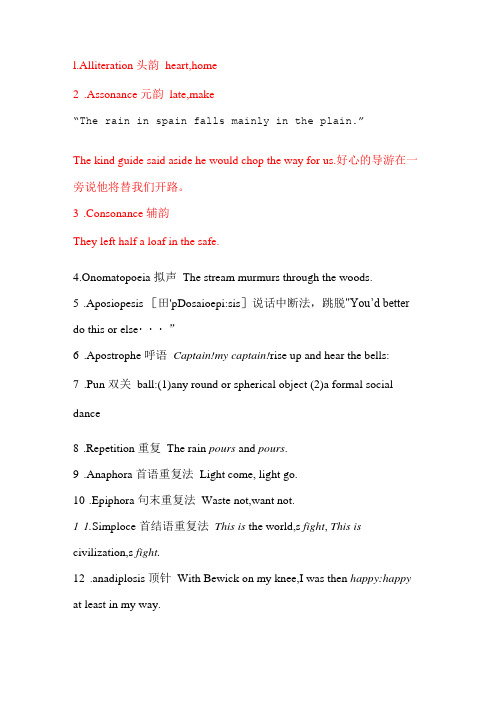
l.Alliteration 头韵heart,home2.Assonance 元韵late,make“The rain in spain falls mainly in the plain.”The kind guide said aside he would chop the way for us.好心的导游在一旁说他将替我们开路。
3.Consonance 辅韵They left half a loaf in the safe.4.Onomatopoeia 拟声The stream murmurs through the woods.5.Aposiopesis [田'pDosaioepi:sis]说话中断法,跳脱"You’d better do this or else・・・”6.Apostrophe 呼语Captain!my captain!rise up and hear the bells:7.Pun 双关ball:(1)any round or spherical object (2)a formal social dance8.Repetition 重复The rain pours and pours.9.Anaphora 首语重复法Light come, light go.10.Epiphora 句末重复法Waste not,want not.11.Simploce 首结语重复法This is the world,s fight, This is civilization,s fight.12.anadiplosis 顶针With Bewick on my knee,I was then happy:happy at least in my way.13.Parallelism 平行结构The young actor was tall,dark,and handsome.14.Antithesis 对偶Marriage is easyjhousekeepin g is hard.15.Climax 层进法We want peace,we want freedom,we want a better life.16.Anticlimax 突降法Where shall I find hope, happiness friends, cigarettes?17.Syllepsis 一语双叙He lost his coat and his temper.18. Zeugma 轭式修辞法We ate a bun and a glass of milk.19. Chiasmus 回文One should eat to live,not live to eat.20.Asyndeton 连词省略法Nothing is insider them, they were sealed up before the creation of pestilence.21.Polysyndeton 连词叠用法I am a soul, or a body, a mind.22.Rhetorical question 反问Isn’t it the best choice?23.Simile 明喻Time flies like an arrow.24.Metaphor 暗喻You are my sunshine.25.Metonymy 借喻He has a good ear for music.26.Synecdoche 提喻He paid the workers $5 per head.27.Antonomasia换称He is modern Hitler---a tyrant.Jack is Michael Jordan on our basketball team.28.Personification 拟人The bird is singing joyfully.29.Parody 仿拟I had no outlook,but an uplook rather.30.Synesthesia 通感The music breathing from her face.31.Transferred epithet 移情a sleepless bed32.. understatement轻描淡写,低调陈述1.AUTHOR &WORKS1>William Faulkner is the author of.A.Far From the Madding CrowdB. Sound and FuryC. For Whom the Bell TollsD. Scarlet LetterKey B2>The Old Man and the Sea is one of the great works by.A. Jack LondonB. Charles DickensC. Samuel ColeridgeD. Ernest HemingwayKey: D3>James Joyce is the author of all the following novels EXCEPT.A. DublinersB. A Portrait of the Artist as a Young ManC. Jude the ObscureD. UlyssesKey: C4>Which of the following is NOT a poem by Emily Dickinson?A. This is my letter to the world.B. / heard a fly buzz —when I died.C. This is just to say.D. Because I could not stop for death.Key: C (William Carlos Williams)5>Francis Bacon' s is a great essay on education.A. The Advancement of LearningB.The Importance of Being EarnestC.The New AtlanticD.The Learned Reading upon the Statute of UsesKey: A6>William Makepeace Thackeray' s most famous work is.A. The School for ScandalB. Past and PresentC. Major BarbaraD. Vanity FairKey: D7>Which of the following poems is NOT written by George Gordon Byron?A.She Walks in Beauty.B.The Solitary Reaper.C.When We Two Parted.D.Childe Harold' s Pilgrimage.Key: B8> William Golding' s first and most well-known novel is.A. Coral IslandB. Lord of the FliesC. Treasure IslandD. The Brass ButterflyKey: B9> Moby Dick is the most important work by.A. Jack LondonB. Herman MelvilleC. Sinclair LewisD. Ralph EllisonKey: B10>Stephen Crane is famous for.A. An American TragedyB. The AmbassadorsC. Main StreetD. The Red Badge of CourageKey: D11>Robert Frost is a famous.A. novelistB. playwrightC. poetD. literary criticKey: C12>Eugene 0' Neil is an American.A. novelistB. playwrightC. poetD. essayist KEY:B 13>is considered to be the best-known English dramatist since Shakespeare, and his representative works are plays inspired by social criticism.A. Richard SheridanB. Oliver GoldsmithC. Oscar WildeD. Bernard ShawKEY:D14>Who is the only woman writer that has won both Pulitzer Prize and Nobel Prize?A. Pearl Buck.B. Virginia Woolf.C. Tony Morrison.D. Katharine Mansfield.KEY: A15>is NOT among the postwar poets in modem American literature.A. Robert LowellB. Gary SynderC. Alien GinsbergD. e. e. cummingsKEY: D16>Shylock is a character in.A. The Merchant of VeniceB. The Twelfth NightC. The Winter's TaleD. MacbethKEY: A17>This line "If Winter comes, can Spring be far behind?' is quoted fromA. Don Juan.B. Kubla KhanC. To AutumnD. Ode to the West Wind KEY: D18>The sentence "Shall I compare thee to a summer' s day" is quoted from Shakespeare' s.A. comediesB. tragediesC. historiesD. sonnetsKEY : D19>"Beauty is truth, truth beauty" is an epigrammatic line by.A. John KeatsB. William BlakeC. William WordsworthD. Percy Bysshe ShelleyKEY: A19>"Beauty is truth, truth beauty" is an epigrammatic line by.A. John KeatsB. William BlakeC. William WordsworthD. Percy Bysshe Shelley KEY: A20>Tess is a character created by.A. D. H. LawrenceB. James JoyceC. Thomas HardyD. Dylan Thomas Key: C21>As a literary figure, Heathcliff appears in.A. Jane EyreB. Oliver TwistC. Wuthering HeightsD. Middlemarch Key: C22>Emily Grierson is a literary figure created by.A. Willa GatherB. Doris LessingC. William FaulknerD. Nathaniel Hawthorn Key: C 23> Mr. Micawber in David Copperfield and Sam Well in Pickwick Papers are perhaps the best characters created by CharlesDickens.A. comicB. tragicC. roundD. sophisticated Key: A24> Mr. Darcy is a character in.A. Tess of the D' UrhervillesB. Pride and PrejudiceC. Happy PrinceD. The Mill on the Floss Key: B25> The image of the famous "henpecked husband" is created by. A. Washington Irving B. Fennimore CooperC. Edith WhartonD. William Dean Howells Key: A 26>is a popular literary form in the medieval period.A. RomanceB. NovelC. SonnetD. Drama Key: A27>was the most important person of the transcendental club.A.HawthornB. WhitmanC. EmersonD. Thoreau Key: C28> The literary spokesman of the Jazz is often thought to beA. O'NeilB. PoundC. Robert FrostD. Scott Fitzgerald Key: D29>Together with Lawrence and Joyce,is considered one of the three giants of the modern English novel and a master of English prose. A. Henry James B. Joseph ConradC. E. M. ForsterD. Aldous Huxley Key: B30>,the author of The Interpretation of Dreams has great impact on literary creation and criticism.A. Carl JungB. Jean-Paul SartreC. Friedrich Wilhelm NietzscheD. Sigmund Freud Key: D 31> Which of the following is NOT a typical feature of Modernism? A.To elevate the individual and inner being over the social being.B.To put the stress on traditional values.C.To portray the distorted and alienated relationships between man and his environment.D.To advocate a conscious break with the past. Key: B32>Whitman's poems are characterized by all the following features EXCEPT.A. a strict poetic formB. a simple and conversational languageC.a free and natural rhythmic patternD. an easy flow of feelings Key: A33> Who initiated the name of the Lost Generation?A. Hemingway.B. Fitzgerald.C. Gertrude Stein.D. William Faulkner. Key: C34> The high tide of Romanticism in American literature occurred aroundA. 1820B. 1850C. 1880D. 1920 Key: A35> The success of Jane Eyre is partly due to its introduction to the English novel the first heroine.A. explorerB. peasantC. workerD. governess Key: D 36>is the representative work of the Beat Generation.A. The Great GatsbyB. On the RoadC. Look Back in AngerD. The Sun Also Rises Key: B 37>The most significant idea of the Renaissance is.A. humanismB. realismC. naturalismD. skepticism Key: A 38>The title of Thackeray's "Vanity Fair" is taken from —A. The Holy BibleB. The Faerie QueenC.The Pilgrim's ProgressD. Paradise Lost Key: C39>Who is considered the father of American poetry?A. Philip Freneau.B. William Cullen Bryant.C. Henry Wadsworth Longfellow.D. Henry David Thoreau.Key: A ( The Wild Honey Suckle)40>Iceberg Theory is a writing principle proposed and closely followed by.A. Jack LondonB. Sinclair LewisC. William FaulknerD. Earnest Hemingway Key: D41>is featured by black humor.A. CaricatureB. Catch-22C. The Catcher in the RyeD. Death of a Salesman Key: B 42>has won the Pulitzer Prize four times and Nobel Prize.A. Ernest HemingwayB. John SteinbeckC. Eugene 0' NeilD. William Faulkner Key: C43>is known as "the poet' s poet".A. ShakespeareB. MarloweC. SpenserD. Donne Key: C44> Robert Burns is a poet from.A. EnglandB. New EnglandC. IrelandD. Scotland Key: D45>Generally, the Renaissance refers to the period between and centuries.A. 14th/mid-17thB. 14th/mid-18thC. 16th/mid-18thD. 16th/mid-17th Key: A46>O Captain! My Captain! was written in memory of.A. Walt WhitmanB. Benjamin FranklinC. Abraham LincolnD. Martin Luther King Key: C47>The first book of the Old Testament is called.A. ExodusB. NumbersC. LeviticusD. Genesis Key: D 48>WilliamBlake' s The Tiger is collected in.A. Songs of InnocenceB. Songs of ExperienceC. Marriage of Heaven and HellD. Poetical Sketches Key: B 49>Who is the father of English poetry?A. Shakespeare.B. Edmund Spencer.C. John Milton.D. Geoffrey Chaucer. Key: D50>The 1954 Nobel Prize for literature was awarded to for his "mastery of the art of modem narration".A.William FaulknerB. John SteinbeckC. Saul BellowD. Ernest Hemingway Key: D51>It is generally regarded that Keats' s most important and mature poems are in the form of.A. odeB. elegyC. epicD. sonnet Key: A52> 0. Henry earned his fame mainly for his.A. novelsB. poemsC. short storiesD. dramas Key: C 53> Works by are characterized by stream-of-consciousness.A. George EliotB. Jane AustenC. Emily BronteD. Virginia Woolf Key: D54>Who of the followings is a playwright of the "theater of absurd" ?A.John Osborn.B. Wystan Hugh Auden.C. Bernard Shaw.D. Samuel Beckett. Key: D55>In the works of such aesthetics, as and Walter Pater, thetheory of "art for art' s sake" is advocated.A. Oscar WildeB. Mrs. GaskellC. Alexander PopeD. Charles Lamb Key: A56>The Romantic Age in England came to an end with the death of .A. Jane AustinB. Walter ScottC.Samuel Taylor ColeridgeD. William Wordsworth Key: B 57>The Victorian Age was largely an age of, eminently represented by Dickens and Thackeray.A. pessimismB. naturalismC. modernismD. critical realism Key: D58>In which novel can "Yahoo" be found?A. John Bunyan' s Pilgrim' s Progress.B.Edmund Spencer' s The Faerie Queen.C. Jonathan Swift's Gulliver's Travels.D.Henry Fielding' s Tom Jones.Key: C (Lilliput, Brobdingnag, Laputa, Yahoo)59>The Bronte Sisters published the following famous novels EXCEPTA. The Tenant of Wildfell HallB. Jane EyreC. Wuthering HeightsD. Agnes Grey Key: A 60>Beowulf narrates a story taking place in.A. the MediterraneanB. Northern EuropeC. EnglandD. Scandinavia Key: D1.The national epic of the Anglo-Saxons is.A . Robin Hood B. Sir Gawain and the Green KnightC. The Canterbury TalesD. Beowulf2.was the most outstanding single romance on the Arthurian legend written in alliterative verse.A. The Canterbury TalesB. Piers the PlowmanC. Sir Gawain and the Green KnightD. Beowulf3. Most of the ballads of the 5 th century focused on the legend aboutas a heroic figure.A. Green NightsB. GawainC. Robin HoodD. Hamlet4.In the 16th century, Thomas More' s work became immediately popular after its publication.A. Paradise LostB. A Pleasant Satire of the Three EstatesC. Of BeautyD. Utopia5.was Edmund Spencer' s masterpiece which has been regarded as one of the great poems in the English language.A. AmorettiB. The Shepherd' s CalendarC. The Faerie QueenD. Four Hymns6.is from Shakespeare' s sonnet No.18.A.Let me not to the marriage of true mindsB.“To be or not to be: that is the question”C.“ Shall I compare thee to a summer' s day”D.“No longer mourn for me when I am dead”7.The vivid portrayal of by Shakespeare in Henry IV has earned for him an enviable place in the history of English literature.A . Julius Caesar B. Falstaff C. Hamlet D. King Henry 8.The four great tragedies written by Shakespeare are Hamlet, Macbeth, Othello and. A. Antony and Cleopatra B. Julius CaesarC. Twelfth NightD. King Lear9.Which of the following does not belong to Shakespeare' s romantic love comedies?A. Twelfth NightB. The TempestC. As You Like ItD. The Merchant of Venice10.The hero who has fallen a victim to his own ambition must be.1.Hamlet B. Othello C. King Lear D. Macbeth 11.is acclaimed as “the poets ' poet” ,A. ShakespeareB. SpenserC. KeatsD. Chaucer 12. The allusion “A Pound of Flesh” comes from Shakespeare ' sA. HamletB. The Merchant of VeniceC. King LearD. Othello13.At the turn of the 18th and 19th centuries appeared in Englandas a new trend in literature.A. RenaissanceB. ReformationC. RomanticismD. Sentimentalism14.Of studies was written by.A. John Bunyan.B. John Donne.C. Francis Bacon.D. William Blake.15.Which of the following is the highest form of literary expression?A. Prose.B. Poetry.C. Novel.D. Speech.16.The 18th century in English literature is an age of.A. novelB. poemC. proseD. play17.Which of the following work tells how Satan rebelled against God and how Adam and Eve were driven out of Eden?A. Paradise LostB. Paradise Regained.C. L' ALLegro.D. Lycidas.18.Who is the creator and a great master of the historical novel?A. John Keats.B. Walter Scott.C. Jane Austen.D. Charles Lamb.19.Bunyan 's most important work is, written in the old-fashioned, medieval form of allegory and dream.A. The FootprintB. On His BlindnessC. Vanity FairD. The Pilgrim's Progress20.Romanticism as a literary movement came into being in England early in the latter half the century.A. 16thB. 17thC. 18thD. 19th21.The novel Oliver Twist was written by.A. Jane AustenB. John Keats C . Charles Dickens D. George Eliot 22.In Anglo-Saxon period, “Beowulf” represented the poetry.A. paganB. religionsC. romanticD. sentimental 23. The epoch of Renaissance witnessed a particular development of English drama. It was who made blank verse the principal vehicleof expression in drama.A. Christopher MarloweB. Thomas LodgeC. Edmund SpenserD. Thomas More24.At the beginning of the 16th century the outstanding humanist wrote his Utopia in which he gave a profound and truthful picture of the people 's suffering and put forward his ideal of a future happy society.A. Thomas MoreB. Thomas MarloweC. Francis BaconD. William Shakespeare25.Of the following plays is not a comedy.A. A Midsummer Night 's DreamB. The Merchant of VeniceC. Twelfth NightD. Romeo and Juliet26.The first poem in The lyrical Ballads is Coleridge 's masterpieceA. Kubla KhanB. The PreludeC. The Rime of Ancient MarinerD. Tintern Abbey27.Dickens takes the French Revolution as the background of the novel.A. A Tale of Two CitiesB. Great ExpectationsC. Hard TimesD. David Copperfield28.Chaucer was the first important poet of a royal court to write in after the Norman Conquest.A. FrenchB. LatinC. EnglishD. Greek29.Beowulf was written in.A. Old EnglishB. Middle EnglishC. Early Modem EnglishD. French30. The English Renaissance period was an age of B. poetry and drama D. romance and poetry 6-10 C B D B D 16-20 C A B D C 26-30 C A C A B A. drama and novelC. novel and poetry1---5 D C C D C 11-15 B B C C B 21-25C A A A D。
大学英语修辞

大学英语修辞1) Simile:(明喻)2) Metaphor:(暗喻)3) Analogy: (类比)4) Personification: (拟人)5) Hyperbole: (夸张)6) Understatement: (含蓄陈述)7) Euphemism: (委婉)8) Metonymy (转喻)9) Synecdoche (提喻)10) Antonomasia (换称)11) Pun: (双关语)12) Syllepsis: (一语双叙)13) Zeugma: (轭式搭配)14) Irony: (反语)15) Innuendo: (暗讽)16) Sarcasm: (讽刺)17) Paradox: (隽语)18) Oxymoron: (矛盾修饰)19) Antithesis: (对照)20) Epigram: (警句)21) Climax: (渐进)22) Anti-climax or bathos: (突降)23) Apostrophe:(顿呼)24) Transferred Epithet: (一就修饰语)25) Alliteration: (头韵)26) Onomatopoeia: (拟声)修辞格(figures of speech)是提高语言表达效果的语言艺术。
它能使语言生动形象、具体活泼,给人以美的享受。
(一)音韵修辞格(phonological rhetorical devices)顾名思义,音韵修辞格是利用词语的语音特点创造出来的修辞手法。
包括: a) Onomatopoeia(拟声) 是模仿事物发出的声响,如:Presently there came theclick of high-heeled shoes.高跟皮鞋声咯咯地传了过来。
b) Alliteration(头韵) 就是在一个词组或一个诗行中,有两个以上彼此靠近的词,其开头的音节(或其他重读音节)具有同样的字母或声音;如:Peter Piper picked a peck of picking pepper.皮特.派特咽下了一口腌菜用的胡椒粉。
英语修辞学(打印版)
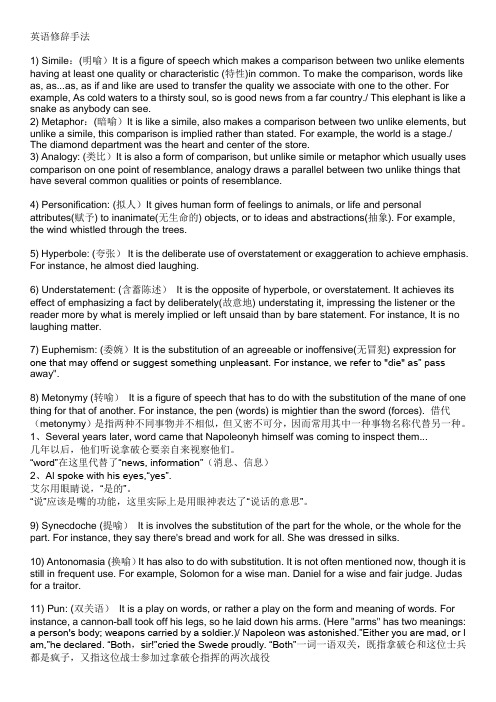
英语修辞手法1) Simile:(明喻)It is a figure of speech which makes a comparison between two unlike elements having at least one quality or characteristic (特性)in common. To make the comparison, words like as, as...as, as if and like are used to transfer the quality we associate with one to the other. For example, As cold waters to a thirsty soul, so is good news from a far country./ This elephant is like a snake as anybody can see.2) Metaphor:(暗喻)It is like a simile, also makes a comparison between two unlike elements, but unlike a simile, this comparison is implied rather than stated. For example, the world is a stage./ The diamond department was the heart and center of the store.3) Analogy: (类比)It is also a form of comparison, but unlike simile or metaphor which usually uses comparison on one point of resemblance, analogy draws a parallel between two unlike things that have several common qualities or points of resemblance.4) Personification: (拟人)It gives human form of feelings to animals, or life and personal attributes(赋予) to inanimate(无生命的) objects, or to ideas and abstractions(抽象). For example, the wind whistled through the trees.5) Hyperbole: (夸张)It is the deliberate use of overstatement or exaggeration to achieve emphasis. For instance, he almost died laughing.6) Understatement: (含蓄陈述)It is the opposite of hyperbole, or overstatement. It achieves its effect of emphasizing a fact by deliberately(故意地) understating it, impressing the listener or the reader more by what is merely implied or left unsaid than by bare statement. For instance, It is no laughing matter.7) Euphemism: (委婉)It is the substitution of an agreeable or inoffensive(无冒犯) expression for one that may offend or suggest something unpleasant. For instance, we refer to "die" as” pass away".8) Metonymy (转喻)It is a figure of speech that has to do with the substitution of the mane of one thing for that of another. For instance, the pen (words) is mightier than the sword (forces). 借代(metonymy)是指两种不同事物并不相似,但又密不可分,因而常用其中一种事物名称代替另一种。
(完整word版)现代大学英语精读5修辞
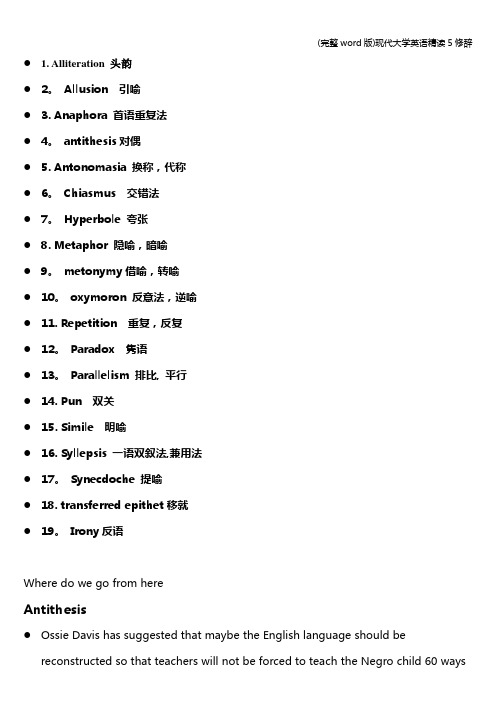
● 1. Alliteration 头韵●2。
Allusion 引喻● 3. Anaphora 首语重复法●4。
antithesis对偶● 5. Antonomasia 换称,代称●6。
Chiasmus 交错法●7。
Hyperbole 夸张●8. Metaphor 隐喻,暗喻●9。
metonymy借喻,转喻●10。
oxymoron 反意法,逆喻●11. Repetition 重复,反复●12。
Paradox 隽语●13。
Parallelism 排比, 平行●14. Pun 双关●15. Simile 明喻●16. Syllepsis 一语双叙法,兼用法●17。
Synecdoche 提喻●18. transferred epithet移就●19。
Irony反语Where do we go from hereAntithesis●Ossie Davis has suggested that maybe the English language should bereconstructed so that teachers will not be forced to teach the Negro child 60 waysto despise himself,and thereby perpetuate his false sense of inferiority, and the white child 134 ways to adore himself,and thereby perpetuate his false sense of superiority。
(para4)●As long as the mind is enslaved,the body can never be free。
(para5)●Psychological freedom ...。
..physical slavery (para5)●And one of the great problems of history is that the concepts of love and powerhave usually been contrasted as opposites - polar opposites——so that love is identified with a resignation of power, and power with a denial of love. (para7)●For through violence you may murder a murderer but you can’t murder.(para19)●The dark yesterdays of segregated schools will be transformed into brighttomorrows of quality,integrated education. (para. 25)●There will be those moments when the buoyancy of hope will be transformed intothe fatigue of despair。
英语修辞学课程教学大纲版汇编
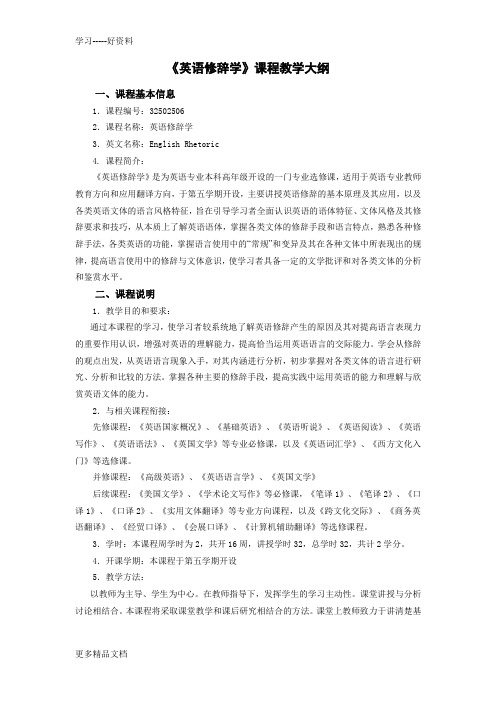
《英语修辞学》课程教学大纲一、课程基本信息1.课程编号:325025062.课程名称:英语修辞学3.英文名称:English Rhetoric4. 课程简介:《英语修辞学》是为英语专业本科高年级开设的一门专业选修课,适用于英语专业教师教育方向和应用翻译方向,于第五学期开设,主要讲授英语修辞的基本原理及其应用,以及各类英语文体的语言风格特征,旨在引导学习者全面认识英语的语体特征、文体风格及其修辞要求和技巧,从本质上了解英语语体,掌握各类文体的修辞手段和语言特点,熟悉各种修辞手法,各类英语的功能,掌握语言使用中的“常规”和变异及其在各种文体中所表现出的规律,提高语言使用中的修辞与文体意识,使学习者具备一定的文学批评和对各类文体的分析和鉴赏水平。
二、课程说明1.教学目的和要求:通过本课程的学习,使学习者较系统地了解英语修辞产生的原因及其对提高语言表现力的重要作用认识,增强对英语的理解能力,提高恰当运用英语语言的交际能力。
学会从修辞的观点出发,从英语语言现象入手,对其内涵进行分析,初步掌握对各类文体的语言进行研究、分析和比较的方法。
掌握各种主要的修辞手段,提高实践中运用英语的能力和理解与欣赏英语文体的能力。
2.与相关课程衔接:先修课程:《英语国家概况》、《基础英语》、《英语听说》、《英语阅读》、《英语写作》、《英语语法》、《英国文学》等专业必修课,以及《英语词汇学》、《西方文化入门》等选修课。
并修课程:《高级英语》、《英语语言学》、《英国文学》后续课程:《美国文学》、《学术论文写作》等必修课,《笔译1》、《笔译2》、《口译1》、《口译2》、《实用文体翻译》等专业方向课程,以及《跨文化交际》、《商务英语翻译》、《经贸口译》、《会展口译》、《计算机辅助翻译》等选修课程。
3.学时:本课程周学时为2,共开16周,讲授学时32,总学时32,共计2学分。
4.开课学期:本课程于第五学期开设5.教学方法:以教师为主导、学生为中心。
英语修辞讲解

第六页,共152页。
2. Metaphor (1-3)
“隐喻”又称暗喻,是用于两个不同类别对象之间的比喻。隐喻与明喻的 区别在于,明喻将本体和喻体说成是相似的,而隐喻则将两者说成是一 致的。明喻中必须有比喻词,而隐喻中则不需要,因此隐喻被称为“压 缩了的明喻”(condensed simile)。
(委婉)
18. Antonomasia (换称)
第三页,共152页。
Content
19. Parody
(仿拟)
20. Reverse
(序换)
21. Anadiplosis
(蝉联)
22. Regression
(回环)
23. Paregmenon
(同源) 24. Malapropism (误用)
25. Correction
第九页,共152页。
Exercise 1
Exercise 1 simile & metaphor (2-2)
Identification of simile or metaphor: 1. Life was like a journey studded (布满了) with pitfalls(陷阱(xiànjǐng)). 2. A real friend is like a mirror that can help you see your mistake clearly. 3. Slimy cannels crept like green snakes beside the road. 4. Applications for jobs flooded the Employment Agency. 5. Not all slim girls are paper tigers. 6. He was a walking encyclopedia.
大学英语写作讲座一:修辞PPT课件
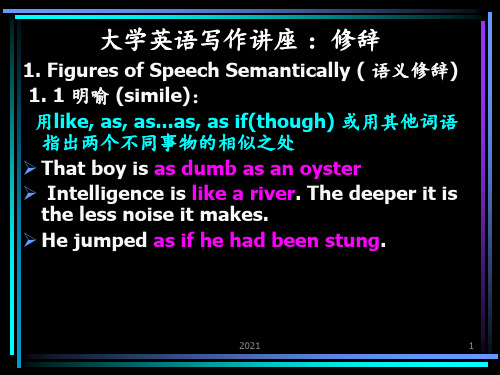
1. Figures of Speech Semantically ( 语义修辞) 1. 1 明喻 (simile): 用like, as, as...as, as if(though) 或用其他词语
指出两个不同事物的相似之处
➢ That boy is as dumb as an oyster
2021
8
1.9 夸张(hyperbole)
运用丰富的想象,过激的言词,渲染和装饰客观 事物,以达到强调的效果。
➢ My blood froze.
➢When I told our father about this, his heart burst.
➢My heart almost stopped beating when I heard my daughter’s voice on the phone.
➢ Intelligence is like a river. The deeper it is the less noise it makes.
➢ He jumped as if he had been stung.
2021
1
1. 2暗喻 (metaphor):
用一个词来指代与该词所指事物有相似特点的另外 一个事物 .
➢ Good technique in medicine and surgery means more quickly—cured patients, less pain, less discomfort, less death, less disease and less deformity.
2021
2021
9
1.10 矛盾修饰 (oxymoron)
高级英语第三册修辞总结第十三单元

高级英语第三册修辞总结第十三单元一、明喻(simile)是以两种具有相同特征的事物和现象进行对比,表明本体和喻体之间的相似关系,两者都在对比中出现。
常用比喻词like,as,as if, as though等,例如:1、This elephant is like a snake as anybody can see.这头象和任何人见到的一样像一条蛇。
2、He looked as if he had just stepped out of my book of fairytales and had passed me like a spirit.他看上去好像刚从我的童话故事书中走出来,像幽灵一样从我身旁走过去。
3、It has long leaves that sway in the wind like slim f ingers reaching to touch something.它那长长的叶子在风中摆动,好像伸出纤细的手指去触摸什么东西似的。
二、隐喻(metaphor)这种比喻不通过比喻词进行,而是直接将用事物当作乙事物来描写,甲乙两事物之间的联系和相似之处是暗含的。
1、German guns and German planes rained down bombs,shel ls and bullets...德国人的枪炮和飞机将炸弹、炮弹和子弹像暴雨一样倾泻下来。
2、The diamond department was the heart and center of t he store.钻石部是商店的心脏和核心。
三、Allusion(暗引)其特点是不注明来源和出处,一般多引用人们熟知的关键词或词组,将其融合编织在作者的话语中。
引用的东西包括典故、谚语、成语、格言和俗语等。
英语引用最多的是源出《圣经》故事以及希腊、罗马神话、《伊索寓言》和那些源远流长的谚语、格言等。
例如:1、Grammar may be his heel of Achilles.语法是他的大弱点。
英语修辞学大纲【精选】

《英语修辞学》课程教学大纲一、说明适用专业四年制本科英语专业语言文学方向先修课程高级英语总学时32总学分2(一)本课程的目的、要求(1)使学生较系统地了解英语修辞产生的原因及其对提高语言表现力的重要作用认识,增强对英语的理解能力,提高恰当运用英语语言的交际能力。
(2)使学生学会从修辞的观点出发,从英语语言现象入手,对其内涵进行分析,初步掌握对语言进行研究、分析和比较的方法。
(3)使学生掌握各种主要的修辞手段,提高实践中运用英语的能力和理解与欣赏英语文学作品的能力。
(二)内容选取和实施中注意的问题(1)本课程应坚持理论与实践相结合的原则,适当介绍修辞理论,重点讲述实用性内容,要求学生运用所学理论分析语言实例。
(2)突出重点、兼顾一般。
在选取内容上要注意以语音、词汇、句子三级修辞方法为重点,其中又应以喻类辞格为重点。
(3)学生对明喻比较熟悉,可以略而不讲或只作为隐喻的比较对象略谈。
(4)培养学生对语言的观察能力,让学生自己寻找例句并作出说明,以加深对所学内容的理解。
(5)大纲中不带“*”号的内容属于基本内容,带“*”号内容可讲可不讲。
(三)教学方法(1)教师为主导、学生为中心。
防止教师一言堂,要在教师指导下,发挥学生的学习主动性。
(2)理论与实践相结合,课堂讲授与学生分析讨论相结合。
(四)考核方式本课程为考查课程,采用口头与笔头相结合的方式:(1)口头方式主要以课堂提问和课堂讨论表现情况为考核依据。
(2)笔头方式主要以学生平时笔头作业完成情况和课程结束时笔头测验成绩为考核依据。
(3)口头考核成绩占40%,笔头考核成绩占60%。
(五)教学内容与学时分配教学章节教学内容学时安排备注1修辞学定义22西方修辞学简史44词语的选择35句子的选择27语音类修辞格48-9句法类修辞格610语义类修辞格611逻辑类修辞格4机动2测验二、大纲内容Chapter 1 What Is Rhetoric?1.1 Rhetoric and oratory1.2 Connotation of rhetoric1.3 Definitions of rhetoric1.4 Five assumptions说明和要求:(1)了解修辞与演说之间的关系(2)修辞学的定义Chapter 2 Brief History of Western Rhetoric2.1 Classical rhetoric (5th c. B.C.---5th c. A.D.)2.2 Rhetoric in the Middle Ages (5th---14th c.)*2.3 Rhetoric in the Renaissance (15th---16th c.)*2.4 New Classical Rhetoric (17th---19th c.)2.5 Contemporary Rhetoric说明和要求:(1)了解西方修辞学产生与发展的历史(2)了解亚里士多德等学者对西方修辞学的贡献(3)了解当今修辞学发展的现状和主要趋势Chapter 4 Choice of Words4.1 Use suitable words4.2 Denotation and connotation4.3 General words and specific words4.4 Abstract words and concrete words4.5 Short words and long words说明和要求:(1)了解词的本义与衍生义(2)了解概括词与特指词的语用功能(3)了解抽象词和具体词的语用功能(4)了解大词和小词的来源和对语体色彩的影响Chapter 5 Choice of Sentences5.1 Types of sentences5.2 Long and short sentences说明和要求:(1)了解不同句子结构的修辞作用(2)了解长句和短句的语用功能Chapter 7 Phonetic Figures of Speech7.1 Alliteration7.2 Assonance7.3 Consonance7.4 Onomatopoeia7.5 Aposiopesis7.6 Apostrophe7.7 Pun说明和要求:(1)本部分从语音在语言中的地位讲起,适当介绍语音学方面的知识,重点提示音韵法在诗歌中所起的重要作用及其对散文、广告等各语体的影响。
大学英语中的修辞手法

大学英语中常见的修辞手法1 明喻(Simile)明喻是一种最简单、最常见的修辞方法,是以两种具有共同特征的事物或现象进行对比,表明本体和喻体的关系,两者都在对比中出现,其基本格式是“A像B”,常用的比喻词有as, like, as if, as though等。
如果使用得当可以把深奥的道理说得通俗、浅显、明白,使人可见可感可悟,把简单的事物表达的更为形象更为生动。
例如:Like climbing a mountain, we struggle up three feet and fall back two.(正如爬山,我们费力爬上三英尺,又掉下去两英尺。
)(大学英语第一册第三单元课文B)I see also the dull, drilled, docile, brutish masses of the Hun soldiery blodding on like a swarm of crawling locusts.(丘吉尔在此使用了一个恰当的比喻,把德国士兵比作蝗虫,因为二者有着共同之处-传播毁灭。
)2 暗喻(the metaphor)暗喻也是一种比喻,但不用比喻词,因此被称作缩减了的明喻(a compressed simile)。
它是根据两个事物间的某些共同的特征,用一事物去暗示另一事物的比喻方式。
本体和喻体之间不用比喻词,只是在暗中打比方,从而更生动、更深刻地说明事理,增强语言的表现力。
例如:I will do anything I can to help him through life's dangerous sea.(我将全力帮助他穿越人生的惊涛骇浪。
)(第二册第三单元课文A)Consider that the same cultural soil producing the English language also nourished the great principles of freedom and right of man in the modern world.(想想吧,孕育英语的文化土壤也同样为当今世界培育了自由和人权准则。
英语修辞学(打印版)

英语修辞手法1) Simile:(明喻)It is a figure of speech which makes a comparison between two unlike elements having at least one quality or characteristic (特性)in common. To make the comparison, words like as, as...as, as if and like are used to transfer the quality we associate with one to the other. For example, As cold waters to a thirsty soul, so is good news from a far country./ This elephant is like a snake as anybody can see.2) Metaphor:(暗喻)It is like a simile, also makes a comparison between two unlike elements, but unlike a simile, this comparison is implied rather than stated. For example, the world is a stage./ The diamond department was the heart and center of the store.3) Analogy: (类比)It is also a form of comparison, but unlike simile or metaphor which usually uses comparison on one point of resemblance, analogy draws a parallel between two unlike things that have several common qualities or points of resemblance.4) Personification: (拟人)It gives human form of feelings to animals, or life and personal attributes(赋予) to inanimate(无生命的) objects, or to ideas and abstractions(抽象). For example, the wind whistled through the trees.5) Hyperbole: (夸张)It is the deliberate use of overstatement or exaggeration to achieve emphasis. For instance, he almost died laughing.6) Understatement: (含蓄陈述)It is the opposite of hyperbole, or overstatement. It achieves its effect of emphasizing a fact by deliberately(故意地) understating it, impressing the listener or the reader more by what is merely implied or left unsaid than by bare statement. For instance, It is no laughing matter.7) Euphemism: (委婉)It is the substitution of an agreeable or inoffensive(无冒犯) expression for one that may offend or suggest something unpleasant. For instance, we refer to "die" as” pass away".8) Metonymy (转喻)It is a figure of speech that has to do with the substitution of the mane of one thing for that of another. For instance, the pen (words) is mightier than the sword (forces). 借代(metonymy)是指两种不同事物并不相似,但又密不可分,因而常用其中一种事物名称代替另一种。
大学英语教材中常见的英语修辞
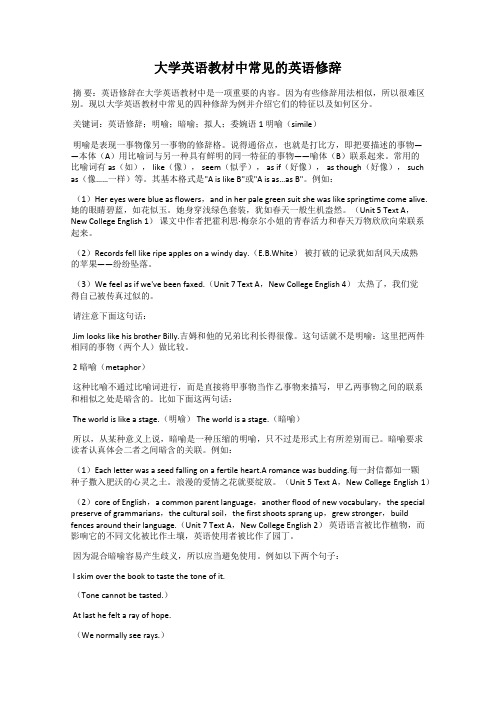
大学英语教材中常见的英语修辞摘要:英语修辞在大学英语教材中是一项重要的内容。
因为有些修辞用法相似,所以很难区别。
现以大学英语教材中常见的四种修辞为例并介绍它们的特征以及如何区分。
关键词:英语修辞;明喻;暗喻;拟人;委婉语1 明喻(simile)明喻是表现一事物像另一事物的修辞格。
说得通俗点,也就是打比方,即把要描述的事物——本体(A)用比喻词与另一种具有鲜明的同一特征的事物——喻体(B)联系起来。
常用的比喻词有 as(如), like(像), seem(似乎), as if(好像), as though(好像), such as(像……一样)等。
其基本格式是"A is like B"或"A is as…as B"。
例如:(1)Her eyes were blue as flowers,and in her pale green suit she was like springtime come alive.她的眼睛碧蓝,如花似玉。
她身穿浅绿色套装,犹如春天一般生机盎然。
(Unit 5 Text A,New College English 1)课文中作者把霍利思·梅奈尔小姐的青春活力和春天万物欣欣向荣联系起来。
(2)Records fell like ripe apples on a windy day.(E.B.White)被打破的记录犹如刮风天成熟的苹果——纷纷坠落。
(3)We feel as if we've been faxed.(Unit 7 Text A,New College English 4)太热了,我们觉得自己被传真过似的。
请注意下面这句话:Jim looks like his brother Billy.吉姆和他的兄弟比利长得很像。
这句话就不是明喻:这里把两件相同的事物(两个人)做比较。
2 暗喻(metaphor)这种比喻不通过比喻词进行,而是直接将甲事物当作乙事物来描写,甲乙两事物之间的联系和相似之处是暗含的。
英语修辞学
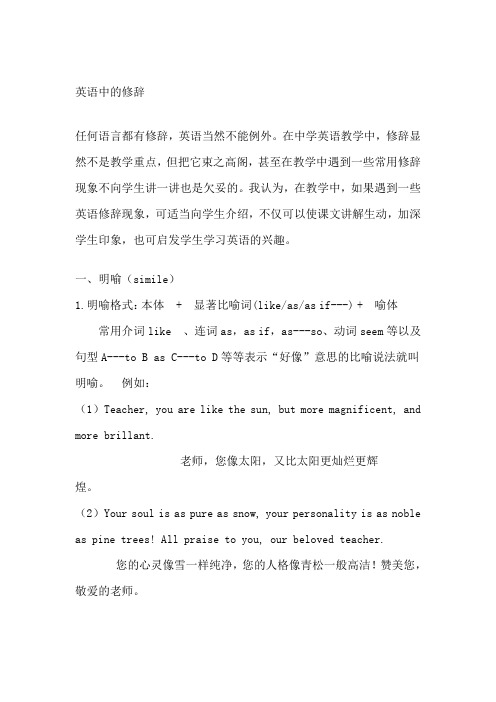
英语中的修辞任何语言都有修辞,英语当然不能例外。
在中学英语教学中,修辞显然不是教学重点,但把它束之高阁,甚至在教学中遇到一些常用修辞现象不向学生讲一讲也是欠妥的。
我认为,在教学中,如果遇到一些英语修辞现象,可适当向学生介绍,不仅可以使课文讲解生动,加深学生印象,也可启发学生学习英语的兴趣。
一、明喻(simile)1.明喻格式:本体 + 显著比喻词(like/as/as if---) + 喻体常用介词like 、连词as,as if,as---so、动词seem等以及句型A---to B as C---to D等等表示“好像”意思的比喻说法就叫明喻。
例如:(1)Teacher, you are like the sun, but more magnificent, and more brillant.老师,您像太阳,又比太阳更灿烂更辉煌。
(2)Your soul is as pure as snow, your personality is as noble as pine trees! All praise to you, our beloved teacher.您的心灵像雪一样纯净,您的人格像青松一般高洁!赞美您,敬爱的老师。
2.英语中除上述的用介词、连词或句型等的明喻表达方式外,还有许多常用的明喻习语。
例如:(1)as clear as crystal清如水晶(2)as weak as water软弱无力(3)brave as a lion;象狮子一样勇敢(4)quick like lightening;象闪电一样迅速这类利用类似汉语的押韵和叠声增加语言的美感。
与此同时,又可以使语言短小精悍,表达生动、形象。
3.高中教材中也有好多例句。
如:(1)Now, the water, which was cold as ice and flowed faster thana river , was above her knees.现在,水流湍急,象冰一样冷,淹没了她人膝盖。
现代大学英语5册修辞解释(1、4、5、9四单元)
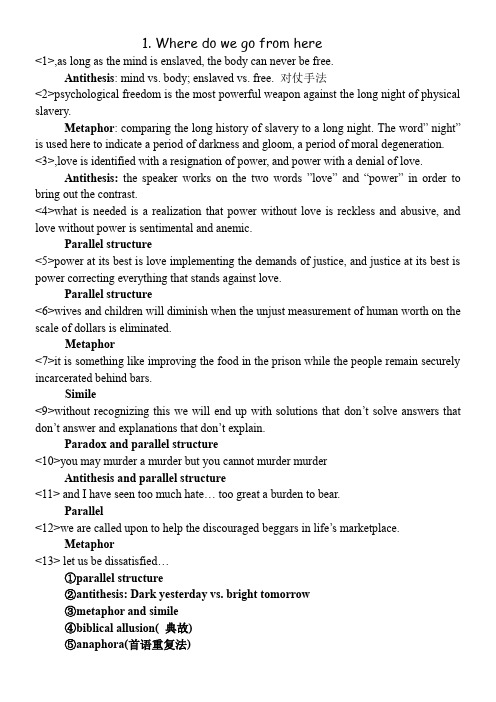
1. Where do we go from here<1>,as long as the mind is enslaved, the body can never be free.Antithesis: mind vs. body; enslaved vs. free. 对仗手法<2>psychological freedom is the most powerful weapon against the long night of physical slavery.Metaphor: comparing the long history of slavery to a long night. The word” night”is used here to indicate a period of darkness and gloom, a period of moral degeneration.<3>,love is identified with a resignation of power, and power with a denial of love.Antithesis:the speaker works on the two words ”love”and “power”in order to bring out the contrast.<4>what is needed is a realization that power without love is reckless and abusive, and love without power is sentimental and anemic.Parallel structure<5>power at its best is love implementing the demands of justice, and justice at its best is power correcting everything that stands against love.Parallel structure<6>wives and children will diminish when the unjust measurement of human worth on the scale of dollars is eliminated.Metaphor<7>it is something like improving the food in the prison while the people remain securely incarcerated behind bars.Simile<9>without recognizing this we will end up with solutions that don’t solve answers that don’t answer and explanations that don’t explain.Paradox and parallel structure<10>you may murder a murder but you cannot murder murderAntithesis and parallel structure<11> and I have seen too much hate… too great a burden to bear.Parallel<12>we are called upon to help the discouraged beggars in life’s marketplace.Metaphor<13> let us be dissatisfied…①parallel structure②antithesis: Dark yesterday vs. bright tomorrow③metaphor and simile④biblical allusion( 典故)⑤anaphora(首语重复法)<14>there will be those methods when the buoyancy(浮力,轻快的心情) of hope will be transformed into the fatigue of despair.Antithesis<15> when our days become darker than a thousand midnights, let us remember that there is a creative force in this universe, working to pull down the gigantism mountains of evil, a power that is able to make a way out of no way and transform dark yesterdays into bright tomorrows. Let us realize the arc of the moral universe is long but it bends towards justice.①metaphor ②antithesis ③paradox4. Professions for womenMetaphor(暗喻)(1)killing the angel in the house(2)The process of fishing is compared to the process of creative writing.(58页中间) (3)Not only space for living,but also space for creative activity. Here a room is compared to freedom,while the house is compared to the whole society.(58页下面)Metonymy(转喻)“the White House”for “the president”, “the crown”for “the king”or for “the queen”5. Love is a fallacy<1>it is not often that one so young has such a giant intellectHyperbole夸张<2>it is, after all, easier to make a beautiful dumb girl smart than to make an ugly smart girl beautiful.Antithesis对仗对偶,“beautiful dumb”and “smart”are balanced against “ugly smart” and “beautiful”<3>back and forth his head swiveled旋转, desire waxing, resolution waningAntithesis对仗对偶, “desire waxing” is balanced against “resolution waning”<4>… he just stood and stared with mad lust at the coatHyperbole,夸张it’s an exaggeration to describe his longing for the coat as “mad lust”<5>I will wander the face of earth, s shambling, and hollow-eyed hulkHyperbole(夸张)1. Metaphor(para.5) a giant intellect (para.34) the field would be open(para.61) the size of my task (para.78) a wave of despair(para.98) the extinct crater in her mind; embers; flame(para.118) a glimmer of intelligence (para.138) the tide of panic3.metonymy 转喻(para20) My brain, the precision instrument, slipped into high gear.The precision instrument my brain is compared to an instrumentGear my brain is compared to a machine.4. antithesis 对仗对偶(para27) It is, after all, easier to make a beautiful dump girl smart than to make an ugly smart girl beautiful.Smart dump; beautiful ugly(para.50) …desire waxing; resolution waning5.alliteration 押头韵(para.23) …let my heart rule my head(para.50) …desire waxing; resolution waning6.parallelism 排比(para.25-para.27) Beautiful she was. Gracious she was. Intelligent she was not7. Hyperbole夸张(para.42) he repeated fifteen of twenty times8. Parody仿拟:(para.53) “What’s Polly to me or me to Polly”---“Hamlet”第二幕第二场:”What’s Hecuba to him or him to Hecuba that should weep for her”(para.97) a logic-proof head e.g. water-proof; dust-proof; shock-proof9.allusion 用典Pygmalion: the sculpture loved by his creatorFrankenstein: the creature who destroyed his creator10.Simile(para.147) bellowing like a bull9. The way to rainy mountainMetaphor…and in summer the prairie is an anvil’s edge. (paragraph 1)personificationAt a distance in July or August the steaming foliage seems almost writhe in fire. (paragraph 1)Simile…popping up like corn to sting the flesh. (paragraph 1)synecdoche metaphorMy grandmother was spared the humiliation of those high gray walls by eight or ten years, but she must have known from birth the affliction of defeat, the dark brooding of old warriors. (paragraph 3)Metonymy…and their ancient nomadic spirit was suddenly free of the ground. (paragraph 4)SimileThe skyline in all directions is close at hand, the high wall of the woods and deep cleavages of shade. (paragraph 6)AlliterationThis is a perfect freedom in the mountains, but it belongs to the eagle and the elk, the badger and the bear. (paragraph 6)The Kiowas reckoned their stature by the distance they could see, and they were bent and blind in the wilderness. (paragraph 6)SimileThe great billowing clouds that sail upon it are shadows that move upon the grain like water, dividing light. (paragraph 7)Simile…they could see the dark lees of the hills at dawn across the Bighorn River, the profusion of light on the grain shelves, the oldest deity ranging after the solstices. (paragraph 7) simile personificationAt the top of a ridge I caught sight of Devil’s Tower upthrust against the gray sky as if in the birth of time the core of the earth had broken through its crust and the motion of the world was begun. (paragraph 8)MetonymyThere are things in nature that engender an awful quiet in the heart of man; Devil’s Tower is one of them. (paragraph 8)Synecdoche MetonymyThere, in a very little while, wood takes on the appearance of great age. (paragraph 11) Synecdoche MetaphorThe windowpanes are black and opaque; you imagine there is nothing within, and indeed there are many ghosts, bones given up to the land. (paragraph 11)AlliterationThe aged visitors who came to my grandmother’s house when I was a child were made of lean and leather and they bore themselves upright.Metonymy…the scars of old and cherished enmities (paragraph 12)…battles that took place in the past and were remembered fondly by those old warriors Metaphor PersonificationNow there is a funeral silence in the rooms, the endless wake of some final word. (paragraph 14)SimileMy line of vision was such that the creature filled the moon like a fossil. (paragraph 14) Synecdoche metaphorThere, where it ought to be, at the end of a long and legendary way, was my grandmother’s grave. Here and there on the dark stones were ancestral names. Looking back once, I saw the mountain and came away.。
Week13修辞格的翻译

转喻(Metonymy)
转喻就是借与人或事物有关联的事物来指代人或事 物。根据上下文,既可以直译,也可以意译。 7.穿蓝衣服的笑着—但穿灰衣服的大鼻子仍然凝视 着。 Blue Suit grinned—but Big Nose in the grey still stared. 8.He chose the gun instead of the cap and gown. 他放弃了上大学的机会,参军了。 Gun代指军队,cap(学士帽)和 gown (学士服)代 指大学。
为了让兄弟们的肩头担起整个大地摇醒千万个太阳江河从这里开始?sothatbrothersshoulders?sothatbrothersshouldersmaylifttheeartharousemillionsofsuns庞秉钧闵福德高尔登编译中国现代诗一百首?由于中西方文化传统语言表达习惯不同有时候译文读者也许不能理解或接受原文的夸张这时候不妨采用意译法
13.为了让兄弟们的肩头 担起整个大地,摇醒千万个太阳 (江河,《从这里开始》) So that brothers’ shoulders May lift the earth, arouse millions of suns (庞秉钧,闵福德,高尔登编译,《中国 现代诗一百首》)
由于中西方文化传统、语言表达习惯不同, 有时候译文读者也许不能理解或接受原文 的夸张,这时候不妨采用意译法。例如: 14.妈妈对小明说:“下次你再不及格, 看我不拧断你的脖子!” Mother said to Xiao Ming, “If you should fail again, I would surely teach you a lesson.”
高级英语8-13课修辞

Advanced English ( I )Rhetorical Devices Applied from 8---13Unit 8 An Interactive Life1.Where he saw internal memos, someone else saw Beethowven. – ( metonymy )2.Will government regulate messages sent out on this vast data highway? --- ( metaphor )3.To prevent getting trampled by a stampede of data, viewers will rely on programmed electronic selectors that could go out into the info corral and rope in the subjects the viewer wants.--- ( metaphor)4. She is a child of the people, born in the very height and heat of battle.– ( alliteration )5. Crafty men condemn studies; simple men admire them; and wise men use them ---(antithesis)6. She says consumers would be a little like information “cowboys,” rounding up data from computer-based archives and information services.---(simile )Unit 9Mark Twain -- Mirror of America1. Metaphor:⏹Mark Twain -- Mirror of America⏹saw clearly ahead a black wall of night...⏹main artery of transportation in the young nation's heart⏹the vast basin drained three-quarters of the settled United States⏹All would resurface in his books...that he soaked up...⏹Steamboat decks teemed...main current of...but its flotsam⏹When railroads began drying up the demand...⏹...the epidemic of gold and silver fever...2. Simile:⏹Most American remember M. T. as the father of...⏹...a memory that seemed phonographic3. Hyperbole:⏹...cruise through eternal boyhood and ...endless summer of freedom...⏹The cast of characters... - a cosmos.4. Parallelism:⏹Most Americans remember ... the father of Huck Finn's idyllic cruise through eternalboyhood and Tom Sawyer's endless summer of freedom and adventure.5. Personification:⏹life dealt him profound personal tragedies...⏹the river had acquainted him with ...⏹...to literature's enduring gratitude...⏹...an entry that will determine his course forever...⏹The grave world smiles as usual...⏹Bitterness fed on the man...⏹America laughed with him.⏹Personal tragedy haunted his entire life.6. Antithesis:⏹...between what people claim to be and what they really are...⏹...took unholy verbal shots at the Holy Land...⏹...a world which will lament them a day and forget them forever7. Euphemism:⏹...men's final release from earthly struggle⏹He tired soldiering for two weeks with a motley band of Confederate guerrillas whodiligently avoided contact with the enemy.8. Alliteration:⏹...the slow, sleepy, sluggish-brained sloths stayed at home⏹...with a dash and daring...⏹...a recklessness of cost or consequences...9. Metonymy:⏹...his pen would prove mightier than his pickaxeUnit 10 The trial that rock the world.1.The trial that rock the world. --- (hyperbole)2.Darrow had whispered throwing a reassuring arm round my shoulder. ---( transferredepithet )3.H. L. Menken wrote sulphurous dispatches sitting in his pants with a fan blowing on him, andthere was talk of running him out of town for….( transferred epithet )4.“The Christian believes that man came from above. The evolutionist believes that he musthave come from below.” ---( antithesis )5.By the time the trial began on July 10, our town of 1500 people had taken on a circusatmosphere. --- ( metaphor)6.…that my case would snowball into one of the most famous trials in US. History.---(metaphor)7.…until we are marching backwards to the glorious age of the sixteenth century …( irony)8.Dudley Field Malone called my conviction a “victorious defeat”.--- ( oxymoron)9.The case had erupted round my head not long after I arrived in Dayton as science master andfootball coach at the secondary school. --- ( synecdoche)10.Darrow walked slowly round the baking court. -- .( transferred epithet )11.One shop announced: Darwin is right – inside. – ( pun )Unit 11 But What's a Dictionary For?Personification1. The storm of abuse in the popular press that greeted the appearance of Webster‟s Third New International Dictionary is a curious phenomenon.2. An article in the Atlantic viewed it as a “disappointment,” a “shock ,” a “calamity,” “a scandal and a disaster.” The Yew York Times, in a special edito rial, felt that the work would…3. The Journal of the American Bar Association saw the publication as ...Alliteration4. --a concept of how things get written that throws very little light on Lincoln but a great deal on Life.Assonance5. The difference, for example, between the much-touted Second International (1934) and themuch-clouted Third International (1961) is not like the difference between yearly models but…Synecdoche6. What of those sheets and jets of air that are now being used, in place of old-fashioned oak and hinges, to screen entrances and exist?7. But neither his vanity nor his purse is any concern of the dictionary’sMetonymy8. The Washington Post, in an editorial captioned "keep Your Old Webster's,” says, in the first sentence, …9. In short, all of these publications are written in the language that the 3rd International describes, even the very editorials which scorn it.Unit 12The LoonsHyperbole1. …dresses that were always miles too long.2. …those voices belonged to a world separated by aeons from our neat worldMetaphor3. …the filigree of the spruce trees4. …daughter of the forest5. I tried another line6. A streak of amberTransferred epithet7. All around, the spruce trees grew tall and close-set, branches blackly sharp against the sky which was lightened by a cold flickering of stars.8. I was ashamed, ashamed of my own timidity, the frightened tendency to look the other way.9. My brother, Roderick, who had not been born when we were here last summer, sat on the car rug in the sunshine and examined a brown spruce core, meticulously turning it round and round in his small and curious hands.Metonymy10. Those voices belonged to a world separated by aeons from our neat world of summer cottages and the lighted lamps of home. ( our modern civilization)Synecdoche11. the damn bone’s flared up againPersonification12. The two grey squirrels were still there, gossiping at us from the tall spruce beside the cottage,13. The news that somehow had not found its way into letters….Unit 13 Britannia Rues the WavesMetaphor:1.….the British fleet risks being elbowed out….2. Yet shipping is the essential lifeline for the nation’s economy.3. ….are bent on taking over the lion’s share….4. To cash in on the container revolution, you need….5.The one area which has weathered the economic storms….6.But P&O has no intention of throwing in the towel.。
大学英语修辞学第十三章

Metonymy is the substitution of the name of one thing for that of another. In metonymy, the name of a referent (or thing referred to) is substituted by the name of an attribute, or entity related in some semantic way, or by spatial proximity, or another kind of link.
Tell the difference between metaphor and metonymy: Metaphor: All the world is a stage. She is a peacock. Metonymy: The kettle is boiling. He likes to read Hemingway. Metonymy cannot be converted into simile. In metonymy, the two unlike things involved have no common quality at all but are closely connected. When we speak of one, the other will come up to our mind.
Metonymy helps to express an idea briefly and effectively by compressing much into a single word or a short noun phrase. The pen is mightier than the sword. By the sweat of thy brow thou shall eat thy bread. He was too fond of the bottle.
高英第5课11,12,13段修辞

...the cause of any Russian fighting for his hearth and home is the cause of free ... (line115)
hearth home [hɑːθ] [həʊm]
used in poetry -----elegant
It is not for me to speak of the action of the United States, but this I will say (line 87)
Inversion倒装句
It is not for me to speak of the action of the United States, but this I will say but I will say this
thrived: successful, strong, healthy, etc 兴旺发达,繁荣,旺盛 prospered: sucessful(especially in making money) 成功,繁荣昌盛 purpose: to produce emphasis, clarity(明晰条理), amplification(扩大影响),or emotional effect
repetition
On the contrary, we shall be fortified……. We shall be strengthened and not weakened in ……. (line91)
parallelism
On the contrary, we shall be fortified……. We shall be strengthened……. (line91)
- 1、下载文档前请自行甄别文档内容的完整性,平台不提供额外的编辑、内容补充、找答案等附加服务。
- 2、"仅部分预览"的文档,不可在线预览部分如存在完整性等问题,可反馈申请退款(可完整预览的文档不适用该条件!)。
- 3、如文档侵犯您的权益,请联系客服反馈,我们会尽快为您处理(人工客服工作时间:9:00-18:30)。
Metonymy is the substitution of the name of one thing for that of another. In metonymy, the name of a referent (or thing referred to) is substituted by the name of an attribute, or entity related in some semantic way, or by spatial proximity, or another kind of link.
4. The species for the genus, or the genus for the species.
1) Did you see that cutthroat ? 2) Alas, that spring should vanish with the rose. 3) He hurled the barbed weapon (harpoon) at the
How to tell synecdoche from metonymy? Synecdoche—the relationship between the two things involved is part-and-whole: that is, one thing is a part of the other. Metonymy—the two things involved are completely different. They are not of the same kind but are juxtaposed and closely correlated. Her heart ruled her head. He paid the workers $5 per head.
6. Trade mark as a name for products. 1) Joanne burned Player after Player in her nervousness at his father‟s eccentric and preoccupied driving. (John Updike) (a brand of cigarettes) 2) He was driving a Ford. (a Ford car) 格力,劳斯莱斯 7. Location as a name for some government, institutions or enterprises. E. g.: Wall Street --- U. S. financial center; Hollywood --- American film-making industry; 北京,中南海,中关村
沉舟侧畔千帆过,病树前头万木春。 朱门酒肉臭,路有冻死骨。
When we make the part-for-whole synecdoche, we should take care to choose the most important and the most obvious feature or part to represent the whole.
In metonymy, the two unlike things do not have common quality but are closely associated: When we speak of one, the other will come up to our mind. Therefore, we can use one to substitute the other. bottle—alcoholic drinks; sword—war and destruction; the press—newspapers, reporters The Caribbean and Pacific islands form an empire on which the dollar never sets. 星条旗永不落。
whale.
of the material for the thing made.
1) He walked the boards for a living. 2) He is in irons.
3) Have you any coppers?
Synecdoche is common in our life. We think, talk and act synecdochically everyday: When someone asks you to show a picture of your friend, you show him a picture of his face. a tree for a forest; a tent a whole battlefield; a row of houses a city President, chairman, group leader, monitor
Tell the difference between metaphor and metonymy: Metaphor: All the world is a stage. She is a peacock. Metonymy: The kettle is boiling. He likes to read Hemingway. Metonymy cannot be converted into simile. In metonymy, the two unlike things involved have no common quality at all but are closely connected. When we speak of one, the other will come up to our mind.
He was left without a roof.
2. The whole for the part.
1) She cut hersef in the kitchen.
2) My TV is out of order. 3) Italy beat Spain in the soccer match.
2. Name of a person as a name for his/ her work or style. 1) Will you play me some Chopin? 2) Have you ever read Jack London? 慨当以慷,忧思难忘。何以解忧?惟有杜康。 (曹操《短歌行》) 3. Name of a clear sign of an object or a person as a name for the object or the person. 1) The thirteen colonies got together to fight the red lobsters. 2) Those big noses, blue eyes and yellow hair taught them English. 纨绔不饿死,儒冠多误身。(杜甫《赠韦左丞》
Metonymy helps to express an idea briefly and effectively by compressing much into a single word or a short noun phrase. The pen is mightier than the sword. By the sweat of thy brow thou shall eat thy bread. He was too fond of the bottle.
3. The abstract for the concrete, or the concrete for the abstract.
1) All the wit and learning of the world were
assembled there. 2) The authorities were greeted. 3) I had the muscle and they made money out of it.
10.4 Synecdoche提喻
Synecdoche is from Greek, meaning „take up with something else.‟ It is a figure of speech in which a part is substituted for the whole, or the whole for the part. strings can mean „stringed instruments‟ (part for whole); England can mean a sports team (whole for part). Sharp words may occasionally be spoken by unguarded or ignorant tongues.
The basic “strategy” in metonymy is the corporeal or tangible for the incorporeal or intangible. “the heart” for “the emotions.” tongue—eloquence; brain—knowledge, wisdom or reason; from the cradle to the grave—from birth to death Farewell to Arms
Sources of metonymy
1. Body part as a name for the sense, behavior or ability. 1) He has a good ear for music. 2) He has a sharp tongue. 3) To jaw-jaw is always better than to war-war. 吵 吵总比打打好。(丘吉尔) 鲁迅的骨头是最硬的。 让我们来谈谈心吧!
